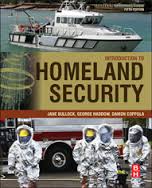Author: Jane Bullock, George Haddow and Damon Coppola
ISBN No: 9780128020289
Review date: 04/05/2024
No of pages: 702
Publisher: Elsevier
Publisher URL:
http://www.elsevier.com/books/introduction-to-homeland-security/bullock/978-0-12-415802-3
Year of publication: 11/06/2015
Brief:
Introduction to Homeland Security: Principles of All-Hazards Risk Management, Fifth Edition by Jane Bullock, George Haddow and Damon Coppola
Introduction to Homeland Security: Principles of All-Hazards Risk Management, Fifth Edition by Jane Bullock, George Haddow and Damon Coppola.
For a book that calls itself an Introduction to Homeland Security, this US work is gigantic, even epic. But then so is the subject. The Department of Homeland Security spends billions and employs hundreds of thousands. The transport security arm alone of DHS spends billions a year. Naturally the US spent something on security before 9-11; but the very concept of homeland security – and the DHS which pulled it together bureaucratically in the US, though not the UK – dates from September 2001. As government bodies do, the DHS has morphed and grown; it takes in things the British would not count as public security, such as floods; and some things that Britain doesn’t see at all, such as earthquakes, volcanic eruptions and tornadoes.
Another trouble for any homeland security set-up is, as the authors point out, the difficulty of predicting terror attacks. The book neatly reminds us of a risk index from 2003; it didn’t really come to pass. Countries have a habit of turning for the worse or not, unexpectedly. Some threats too, such as chemical or biological weapons, haven’t really happened. For all the emphasis on federal budgets and organisational charts, much of the infrastructure of the US (as in the UK) is, as the authors to their credit point out, is privately owned. 9-11 hit corporate America; the death toll at the World Trade Center, and the other losses, were far grater than at the Pentagon. One of the book’s authors with a hotel background recalls response to a suicide bomber at a hotel in Malaysia. The private sector is contrasted with Hurricane Katrina, lamentably mishandled by the US state from President Bush down. If FEMA (the federal emergency management agency) had been a private firm, its stock would have plunged, executives would have been fired.
The book covers transport security; cyber-security and protection of critical infrastructure, such as utilities; and emergency response. As so often in the security and above all homeland security field, the authors are American and, reasonably enough, they take the United States as their subject. The details of federal bureaucracies and budgets, and laws, won’t apply to British readers. That said, there’s material dotted through such a large book for the British security manager readers, whether preparing for Ebola, or doing exercises to foster your preparedness; or crisis communications or social media as a tool to communicate in a disaster. Here the London bombings of July 7, 2005 are among examples. And all can read with interest the research and development work by the DHS (a billion-dollar effort, needless to say) in physical and cyber security alike; and the final chapter on ‘the future of homeland security’. It’s evolving; and as a ‘cobbled together’ department, it’s still taking time ‘to become a functioning organisation’, which might raise eyebrows, given all the billions of dollars pumped in. The UK seems to be going about things in the way right for it. It made sense to bring the DHS together to address the threat, but there so much to be done – educate the public ahead of a natural or man-made emergency; work with the private sector, so as not to leave gaps or cause waste by duplicating; manage online threats, including terrorist recruitment; besides do the day to day screening.
The authors close by seeing yet more years ahead of the DHS struggling ’to establish an integrated and effective national homeland security system’. If your work involves the US and homeland security at all, whether for transport or supply chain or cyber, this is the book to give you the background detail.
About the authors
Jane Bullock, Founding partner, Bullock and Haddow LLC; Former Chief of Staff to the Director of FEMA
George Haddow, Founding partner, Bullock & Haddow LLC; Adjunct Professor, Homeland Security Studies program, Tulane University, New Orleans, LA
Damon Coppola, Senior Associate, Bullock & Haddow LLC, Singapore










